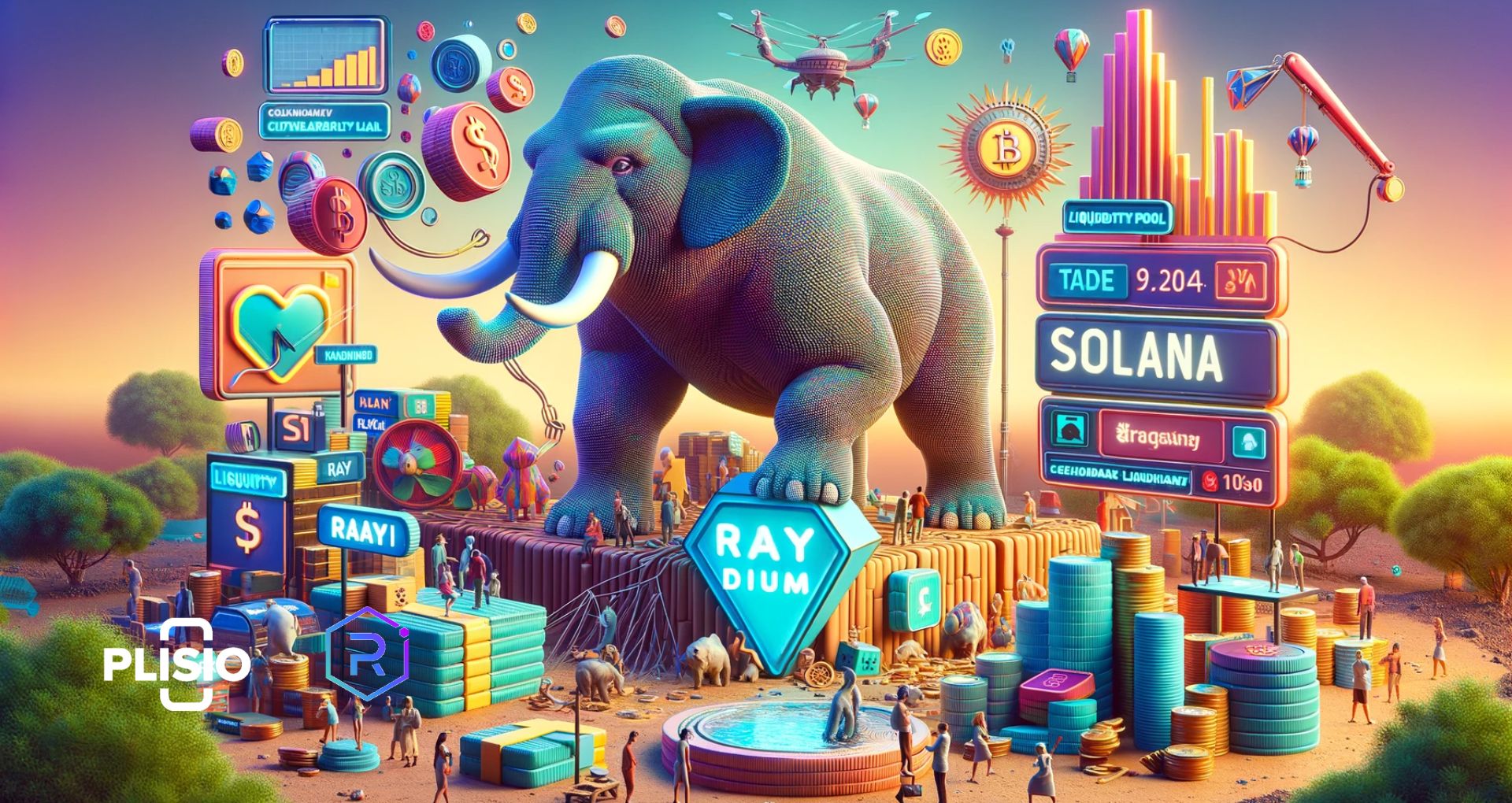Raydium (RAY): Solana`s DeFi Liquidity Mammoth

The decentralized finance (DeFi) landscape has undergone significant transformation in recent years, becoming more dynamic and rapidly evolving. As of early 2023, the DeFi sector boasted an impressive $127 billion in Total Value Locked (TVL), indicative of its burgeoning growth. However, this rapid expansion hasn't been without challenges. High transaction costs and network congestion, particularly on the Ethereum blockchain, have emerged as prominent concerns. These issues stem from slow transaction speeds and the exorbitant cost of operations like depositing ETH in liquidity pools, which can exceed $100. Moreover, the DeFi space faces the complication of fragmented liquidity pools across various competing protocols, further complicating the landscape.
In response to these challenges, the development of both layer 1 and layer 2 protocols has been accelerated, aiming to streamline processes and reduce bottlenecks. A standout in this effort is Raydium, a platform leveraging the Solana network to address some of the most pressing issues in the DeFi space. This platform is committed to providing near-instantaneous swaps, on-chain liquidity, and seamless yield farming opportunities, offering a more efficient and user-friendly experience in DeFi transactions. Unlike traditional DeFi setups, which lack an order book and limit trading options, Raydium enhances the trading experience by addressing these limitations and offering more flexibility and efficiency to its users.
What Is Raydium (RAY)?
Raydium, a pioneering platform in the decentralized finance (DeFi) space, is an automated market maker (AMM) and decentralized exchange (DEX) built on the Solana blockchain. This platform stands out for its integration with Serum, Solana's largest DEX, allowing it to leverage Serum's central limit-order book for enhanced trading efficiency. Raydium's design addresses common challenges in DeFi, such as high gas fees, slow transactions, and fragmented liquidity, by utilizing the high-speed and low-cost capabilities of the Solana blockchain.
One of Raydium's key strengths is its ability to enable swift and affordable trades, a notable advantage over platforms relying on the Ethereum network. Solana's underlying blockchain technology, based on Proof of History (PoH), allows for up to 65,000 transactions per second with minimal block times, making it a high-performance and scalable solution. This capacity is expected to double every two years, keeping pace with hardware and bandwidth improvements.
Raydium also offers unique features that set it apart from other AMMs. Its integration with Serum's order book allows market participants to trade digital assets with more flexibility, and Raydium's liquidity pools contribute to Serum's order book, enhancing the overall liquidity. This integration ensures that orders placed on Raydium can be transacted against by anyone on Serum, and vice versa.
In addition to its trading capabilities, Raydium provides various earning opportunities for its users. Liquidity providers are rewarded in RAY, the platform's native utility token. RAY holders can stake their tokens on the platform to earn additional rewards. Raydium also features a token launchpad, AcceleRaytor, providing further utility for RAY token holders, including potential governance rights in the future.
Despite being relatively new, launched only in February 2021, Raydium has quickly gained traction and popularity. It ranks highly in Total Value Locked (TVL) within the Solana ecosystem, reflecting the growing interest in efficient and scalable DeFi solutions. The platform's dual reward farming system and the ability to facilitate cross-platform transactions, including interoperability with Ethereum, further underscore its innovative approach in addressing the evolving needs of the DeFi community.
The team behind Raydium
The project was founded by a team of pseudonymous individuals, led by AlphaRay, who embarked on this venture in the summer of 2020. Each team member, adopting a "ray" suffix in their pseudonym, brings a unique set of skills and backgrounds to the table, significantly contributing to Raydium's development and success.
AlphaRay, the driving force behind Raydium, manages the overall business strategy, operations, and product direction. Having delved into DeFi in 2020, AlphaRay identified the need for an orderbook AMM to aggregate liquidity. This realization, coupled with the launch of Serum, led to the assembly of a team adept in trading and development to address this need. Before Raydium, AlphaRay's expertise was rooted in commodity algorithmic trading, but he pivoted to cryptocurrency market making and liquidity provision in 2017.
XRay, the Chief Technology Officer (CTO) and Development Team leader, has eight years of experience in trading and architecting low-latency systems for both traditional and crypto markets. XRay is the mastermind behind Raydium's systems and infrastructure, ensuring that the platform operates efficiently and effectively.
GammaRay, the chief of marketing, handles the platform's marketing and communications. Before joining Raydium, GammaRay was involved in technical analysis and discretionary trading within the cryptocurrency sector. He plays a significant role in product strategy and development.
StingRay, an experienced senior developer, manages the on-chain order book for Raydium, bringing innovative solutions and a keen eye for detail to the platform. His expertise in operating systems and trading development is crucial for the project's success.
Lastly, RayZor, a smart contract developer with a background in systems security engineering, ensures the safety and security of capital within the Raydium ecosystem. RayZor's experience includes writing smart contracts for Ethereum and BSC, and working as a white hat tracker, a role critical to maintaining the integrity of the platform.
Together, this team, with over two decades of collective experience in market making, arbitrage, and high-frequency trading in both cryptocurrency and traditional markets, has built Raydium into a significant DeFi platform on the Solana blockchain. Their diverse backgrounds in marketing, algorithmic trading, blockchain development, and mathematics have been instrumental in Raydium's growth and innovation.
How Does Raydium Work?
Raydium, an innovative automated market maker (AMM) built on the Solana blockchain, offers a unique blend of features that enhance the decentralized finance (DeFi) trading experience. This platform integrates the speed and affordability of Solana with the liquidity and order book functionality of the Serum decentralized exchange (DEX), providing a superior trading environment.
Trading and Liquidity Pools
Raydium's trading experience mirrors that of Ethereum-based DEXs but with key distinctions, including unparalleled liquidity and the ability to place limit orders on select tokens, thanks to its integration with Serum DEX. This integration enables access to a central limit-order book system, allowing users to choose between limit-order book trading and swaps via liquidity pools. Raydium’s swap interface uses a constant function market-maker algorithm for price determination, while its liquidity pools have access to the entire Serum ecosystem's order flow and liquidity, ensuring optimal pricing for swaps.
Constant Function AMM and Market Making
Raydium's constant function AMM uses the formula K = Y * X, where K remains constant while X and Y represent different token quantities. This stateless approach to tokens in the AMM allows for infinite liquidity. Raydium strategically places orders from its liquidity pools into Serum's order book, aligning with market demand and utilizing the Fibonacci sequence to place up to 20 orders at varying prices. This setup facilitates up to 65,000 transactions per second with minimal fees and rapid block times, leveraging Solana's Proof of History (PoH) consensus.
Farming and Staking
Raydium's 'dual reward farming' feature allows liquidity providers to earn additional yield on LP tokens earned by providing assets to liquidity pools. Raydium also enables staking of its native token, RAY, offering rewards from platform trading fees. The platform's permissionless pool system allows anyone to create a liquidity pool for any SPL token pair, further democratizing the liquidity provision process.
AcceleRaytor Launchpad
Raydium's AcceleRaytor serves as a launchpad for new projects within the Solana ecosystem, facilitating capital raising and initial liquidity in a decentralized manner. This feature allows projects to launch token offerings, with participation determined by a lottery system for RAY token stakers. AcceleRaytor supports project growth and fosters community engagement within the Solana network.
Transaction Fees
Raydium imposes a 0.25% fee for trades executed within its liquidity pools, with a portion of this fee being redistributed to liquidity providers and RAY stakers. For transactions completed via Serum DEX, the fee structure is influenced by the number of SRM tokens staked.
In summary, Raydium leverages the Solana blockchain's technical capabilities and Serum DEX's infrastructure to offer a dynamic, efficient, and user-friendly trading experience. With features like market-making, yield farming, staking, and a launchpad, Raydium addresses the needs of a diverse range of DeFi participants, from traders to project developers.
The RAY token
The Raydium Token (RAY), integral to the Raydium network, exists as a multifaceted asset with various utilities and a broad distribution model. As a native token, RAY is not only functional within the Solana ecosystem as an SPL token but also extends its reach to the Ethereum network as an ERC-20 token.
Utility and Functions of RAY
RAY token offers a wide array of uses within the Raydium ecosystem. It serves as a key instrument for protocol governance, allowing RAY holders to participate in decision-making processes by voting on proposals that influence the ecosystem's future direction. In addition to governance, RAY token holders benefit from earning a portion of the trading fees generated on the Raydium exchange. This is structured so that each trade or swap on Raydium incurs a nominal fee of 0.25%, out of which 0.22% is allocated to liquidity providers (LPs), and 0.03% contributes to a staking pool, rewarding users who stake their RAY tokens. The token also facilitates staking and provides access to token launch events through the AcceleRaytor launchpad, where staking RAY for a certain duration is a prerequisite.
Tokenomics and Distribution
The total supply of RAY tokens is capped at 555 million, all minted at launch. Of this, approximately 119 million RAY tokens are currently in circulation, with the network holding about $229 million in Total Value Locked (TVL). The allocation of RAY tokens is carefully structured, with 34% reserved for the Mining Reserve, amounting to about 188 million RAY. The Partnership and Ecosystem fund, constituting 30% of the total supply, equates to around 166 million RAY, earmarked for fostering the ecosystem and rewarding the community.
The founding team is allocated 20% of the supply, which is about 111 million RAY, subject to a three-year vesting period. Liquidity considerations account for 8% (approximately 44 million RAY), while community and seed funding are allocated 6% (about 33 million RAY) of the total supply. Advisors receive a 2% share, which translates to around 11 million RAY, with these tokens also subjected to vesting periods.
In terms of distribution strategy, RAY was initially launched through Liquidity Mining in February 2021. At the outset, 22% of the total supply was allocated to the Founders, while the remaining was divided between Premined Rewards and Airdrops, with 22% and 78% respectively. This strategy aimed to incentivize early adopters and contribute to the robust growth of the Raydium ecosystem.
In summary, the RAY token plays a pivotal role in Raydium’s ecosystem, providing governance, earning opportunities, and serving as a key component in the platform's liquidity and partnership initiatives. Its thoughtful distribution and multi-network presence underscore its significance within the DeFi landscape.



